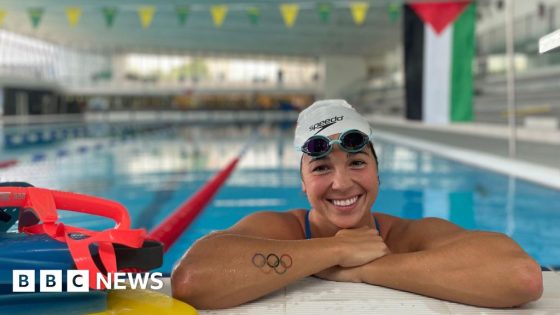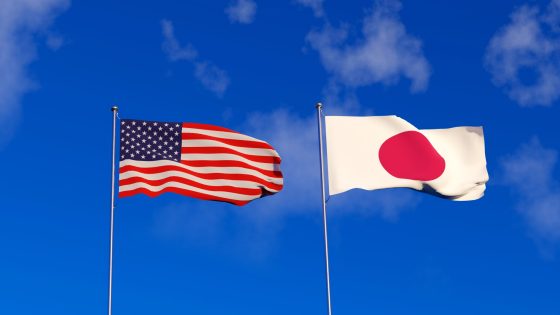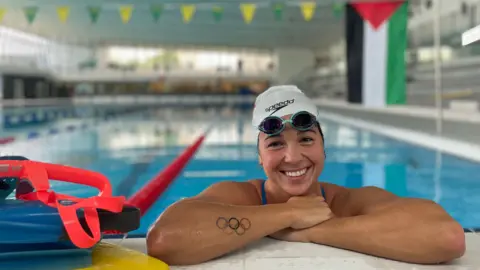 BBC
BBCAs she put in some last practice lengths in Paris last week, Palestinian-American swimmer Valerie Tarazi thought back to her moment of inspiration: watching the legendary Michael Phelps winning eight golds in Beijing in 2008.
“That was like my first like, ‘Oh my gosh, I want to be an Olympian’,” she said.
Paris is a dream come true, as it is for countless athletes taking to sport’s biggest stage. But after more than nine months of war in Gaza and the deaths of tens of thousands of Palestinians, Tarazi says her participation is also an act of commemoration.
“It’s me honouring them,” she said.
A child of the huge Palestinian diaspora, Tarazi, who swims in the 200m individual medley next Friday, was born and raised in the US. But she celebrates her connections to one of Gaza’s oldest Christian families.
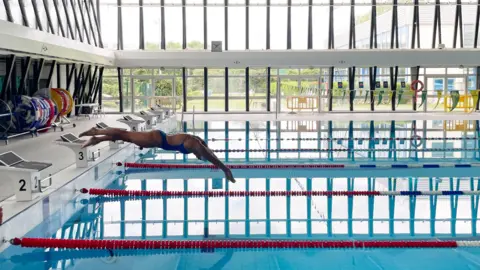
She says four members of her extended family were killed when a church was hit during intense Israeli bombing last December.
“It takes a toll on us,” she said of Gaza’s rising death toll, which is now approaching 40,000.
“This is our friends, our family, our teammates or national team members,” she said.
The International Olympic Committee has recognised the state of Palestine since 1995. Three quarters of UN members also now recognise Palestine, but the US, Britain and the host of this year’s games do not.
Despite her punishing training schedule and the sacrifices needed to compete at this level, Tarazi is acutely aware that she is in a uniquely privileged position, offered the chance to carry the flag in the world’s greatest sporting jamboree.
“My little bit of pain is absolutely nothing compared to what they have to go through every single day,” she said of her compatriots back home.
One of her less fortunate teammates, Tamer Qaoud, is having a hard time keeping his own sporting ambitions alive.
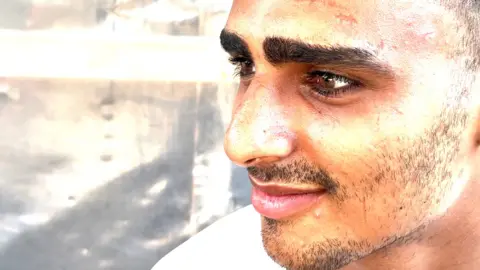
His house in Gaza has been destroyed. He and his family have been forced to move twice during the war. They’re now living in a tent in Deir el-Balah, in the middle of the Gaza Strip.
“My dream was to reach the Olympics,” he told the BBC this week.
“Unfortunately, due to the war and circumstances, we couldn’t leave Gaza.”
Qaoud, a 1500 metre runner, has already represented his country twice.
A year ago, at the Arab Games in Algiers, he wore running spikes for the first time. It was also the first time he’d ever run on anything other than concrete.
In September, he joined Tarazi at the Asian Games in Hangzhou, in China.
They were still there when war broke out in Gaza in early October. Qaoud says he had to go home.
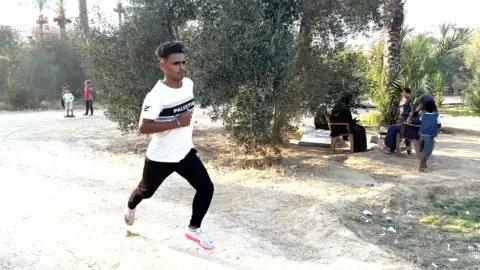
His best time is well outside the Olympic qualifying mark, but any faint chance he might have had of competing in Paris, even on a wild card, quickly vanished.
“I wanted to compete with the world’s best athletes, like Jakob,” he said, referring to the current men’s 1500 world champion, Jakob Ingebrigtsen.
“I wanted to run alongside him, to feel what it’s like to compete with the world’s best.”
Amid the tents, the dust and the date palms of Deir el-Balah, he still trains, wearing his white Palestinian uniform, watched by small groups of bewildered children.
His old training ground, Gaza City’s Yarmouk Stadium, is a waste ground of rubbish and displaced Palestinian families, seeking shelter amid the stands.
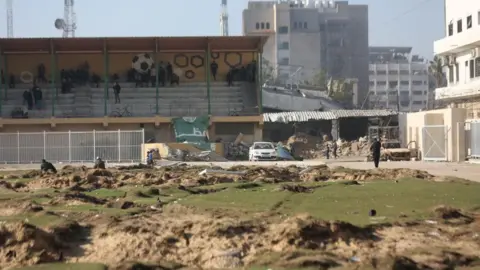
And his coach, Bilal Abu Samaan, was killed in an Israeli airstrike last December, one of an estimated 182 athletes and sports officials killed since last October, according to the Palestinian Football Association.
Qaoud knows his time has not yet come. Unless he can get out of Gaza, he fears it never will.
“The war destroyed everything, shattering our dreams,” he said.
“I hope to leave Gaza, join a training camp, regain my old strength and come back stronger than before.”
Back in the pool in Paris, another Palestinian swimmer, Yazan al-Bawwab, said he was proud to be an ambassador for a place where just playing sport is a challenge.
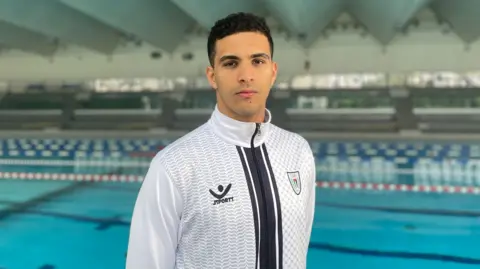
“We don’t have a pool in Palestine,” he said. “We don’t have infrastructure.”
Like Tarazi, al-Bawwab was born and raised abroad, but he wears his uniform, and his identity, with fierce pride.
“France does not recognise Palestine as a country,” al-Bawwab said defiantly, repeating the sentence for emphasis.
“I’m here, raising the flag.”
Source Agencies

